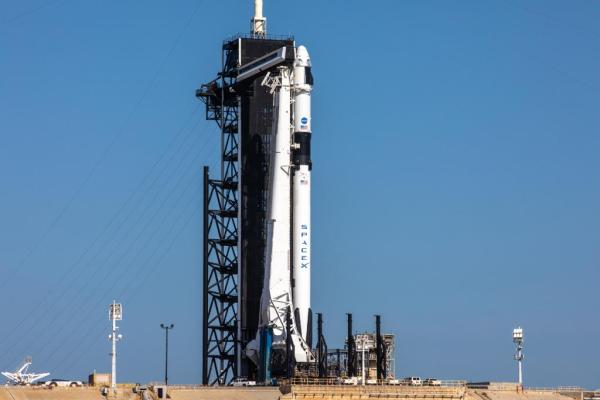
NASA and SpaceX are closer than ever to a moment both have been preparing for since the beginning of the Commercial Crew program in 2010. SpaceX’s Falcon 9 and Crew Dragon spacecraft are now set to fly with NASA astronauts Doug Hurley and Bob Behnken onboard, making a trip to the International Space Station, and both the agency and SpaceX announced today that they have officially passed the final flight readiness review, meaning everything is now a ‘go’ for launch.
According to NASA Commercial Crew Program manager Kathy Leuders during a press conference on Monday, everything went well with all pre-launch flight checks thus far, including a full-length static test fire of the Falcon 9’s engines, and a dress rehearsal of all launch preparation including strapping Hurley and Behnken into the rocket.
The only remaining major hurdle for SpaceX and NASA now is the weather, which is currently only looking around 40% favorable for a launch attempt on schedule for Wednesday, May 27 at 4:33 PM EDT, though during today’s press conference officials noted it is actually trending upwards as of today.
SpaceX and NASA will be paying close attention to the weather between now and Wednesday, and since this is a highly sensitive mission with actual astronauts on board the spacecraft, you can bet that they’ll err on the side of caution for scrubbing the launch if weather isn’t looking good. That said, they do have a backup opportunity of May 30 in case they need to make use of that, as well as another window on May 31.
Hans Koenigsmann, VP of Mission Assurance at SpaceX, noted that there were “no showstoppers” during the static test fire on Friday, and also commented that seeing the actual astronauts climb aboard the Crew Dragon during the dry dress rehearsal really drove home the seriousness and impact of this moment. It will mark the first ever human spaceflight for SpaceX, and the first time astronauts have launched from U.S. soil since the end of the Space Shuttle program in 2011.
Koenigsmann went through the schedule for launch day, which include Behnken and Hurley getting ready and suited up around 4 hours before, be drive over in the custom Tesla Model X astronaut transit vehicle at around 3 hours prior, and get into the capsule at around 2.5 hours before launch time. The rest from there is somewhat similar to other Falcon 9 launches, he said, with the exception of the escape system arming at 45 minutes prior to launch, and the arm retracting 10 minutes later, at which point the automated launch system takes over just like it does for other Falcon 9 flights.
Post-launch, Behnken and Hurley will spend 19 hours on orbit, with orbit-raising burns and also a manual flight test (the rest of the time Crew Dragon should be under fully automated control) for around 30 minutes just prior to docking. Then, it’ll dock and open the hatch around 2 hours later.
The departure schedule for Behnken and Hurley to leave the ISS is in flux – NASA will provide that date, sometime between 6 weeks and 16 weeks from launch. The astronauts will then back into Dragon, suit up, undock from the station, and land in the Atlantic around two hours later for recovery.
This is the culmination of many years’ work, and will be the first human flight for the Commercial Crew program. If all goes well, SpaceX could then begin flying astronauts during regular operational missions for ferrying astronauts to and from the Space Station as early as later this year.
https://news.google.com/__i/rss/rd/articles/CBMiZmh0dHBzOi8vdGVjaGNydW5jaC5jb20vMjAyMC8wNS8yNS9uYXNhLWFuZC1zcGFjZXgtY29uZmlybS1zcGFjZXhzLWZpcnN0LWV2ZXItYXN0cm9uYXV0LWxhdW5jaC1pcy1hLWdvL9IBamh0dHBzOi8vdGVjaGNydW5jaC5jb20vMjAyMC8wNS8yNS9uYXNhLWFuZC1zcGFjZXgtY29uZmlybS1zcGFjZXhzLWZpcnN0LWV2ZXItYXN0cm9uYXV0LWxhdW5jaC1pcy1hLWdvL2FtcC8?oc=5
2020-05-25 22:44:02Z
52780800879773
Tidak ada komentar:
Posting Komentar